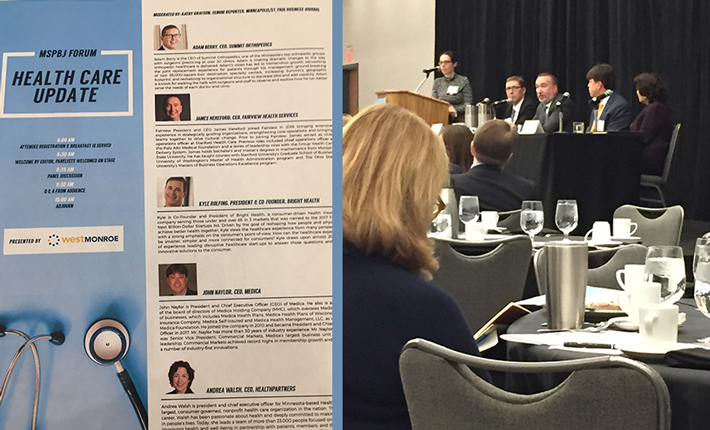With the hot topic of health care and an enviable panel made up of CEOs from Summit Orthopedics, Fairview Health Services, HealthPartners and Medica, it’s no surprise the inaugural Minneapolis-St. Paul Business Journal Forum: Health Care Update event was sold out. My colleague Michelle Cook and I attended the event, held last week on a snowy morning in downtown Minneapolis, that included a lively panel discussion, moderated by Minneapolis-St. Paul Business Journal’s senior health reporter, Kathy Grayson, that focused on the biggest opportunities and challenges facing the industry locally and beyond in 2018. We always look forward to being a part of conversations like these to help inform communications strategies for our clients in the medical space, and this discussion didn’t disappoint.
Panelists included:
- Andrea Walsh, CEO of HealthPartners
- Adam Berry, CEO of Summit Orthopedics
- James Hereford, CEO of Fairview Health Services
- John Naylor, CEO of Medica
*Kyle Rolfing, CEO of Bright Health, was scheduled to participate, but ended up unable to attend
During the hour-long panel discussion and 25-minute Q&A session, the health care leaders covered a wide range of topics and didn’t always see eye-to-eye, but one thing they all agreed on: The focus of 2018 and beyond needs to be figuring out how to better deliver quality, affordable health care in the most convenient way for the consumer/patient.
The challenge isn’t anything new, it’s one that’s plagued the health care industry and its leaders for decades; however, the panelists all mentioned some of the new ways their organizations and others are trying to address it.
The consumerization of care
One of the main themes of the discussion was the consumerization of care, which will continue to inform the way companies innovate to meet the needs of their population, as well as how they communicate to and engage with that population. All panelists agreed one of the most impactful ways that care can be improved is through the ongoing development of telephonic and digital services to meet individuals where they are – whether in home, in a local clinic or hospital, or a non-traditional care setting. Technology will be the driving force in creating convenient experiences while helping manage costs. Rather than concentrating care in urban environments, there has and may continue to be a retailization of services through new hyperlocal provider locations as well as through non-traditional partnerships, like the one we’ve seen with CVS and Aetna.
The healthcare industry as a whole will need to continue to look outside itself, towards the leaders in technology, retail and beyond who have already proven themselves successful in attracting and engaging consumers, and developing high-quality product experiences that fit their lifestyle. And while the medical industry looks outward, panelists agreed that new players will come into the space – players who may not yet have the healthcare expertise, but the right models for excellent consumer brands and experiences.
The Twin Cities are well known in the healthcare space for being innovative and unique collaboration among providers, payers, corporations and non-profits to better the quality and care of patients. Panelists agreed, to maintain our region’s position as national health care leaders, this collaboration needs to continue while staying mindful of the holistic needs of the community.

